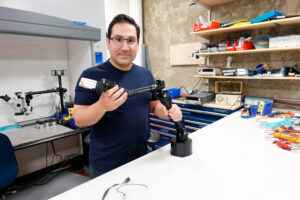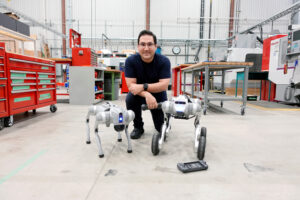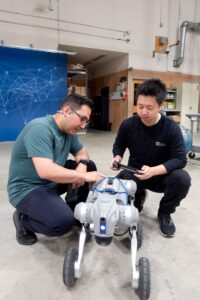
Fardin Barekat joined the MAKE+ applied research team at the BCIT Centre for Applied Research and Innovation (CARI) in 2022. Since then, Fardin has been transforming ideas into real-world solutions and mentoring students.

What is your role with MAKE+?
In my current position as a Research Associate, I’m responsible for the technical aspects of transforming ideas and concepts into reality for CARI’s clients and internal projects. I also provide supervision, training, and mentorship to students.
What inspired you to pursue a career in applied research?
Before joining BCIT, I worked in various industries for 10 years, gaining experience in fields like automotive, industrial food processing, precision equipment and sensing, machine learning, facial recognition, and 3D printing. During that time, I also taught electronics, coding, and robotics to K-12 students in after-school programs and summer camps. When the opportunity at BCIT arose, I was very excited and couldn’t pass it up. The applied research department aligns perfectly with my skill set, and my work with the MAKE+ team closely reflects the personal projects I pursue as a hobby.
What kinds of projects does MAKE+ work on?
The MAKE+ team works on a wide range of projects, but as the only institute in Canada with ISO 13485 certification, most of our work focuses on medical device prototyping. Our work is important because clients often have great ideas but lack the skills to bring them to life. We help with everything from electrical and mechanical engineering to sensor selection, part sourcing, fabrication, and prototype assembly. On top of that, we conduct risk assessments for every part of the prototype to ensure it is safe and won’t cause problems.

What is a recent project you’re proud of?
I’m most proud of the Soft Hand Project, a 3D-printed prosthetic arm designed for children and adults with arm amputations. The goal of this project was to create a simple, configurable, functional, and low-cost prosthetic hand that could help amputees pick up everyday objects. This project is specifically aimed at those who can’t afford expensive robotic prosthetics, making it possible for a greater number of amputees to perform daily tasks.

Applied research is about solving real-world challenges. What challenge are you tackling right now?
We recently bought a robot dog with the goal of turning it into an assistive device for wheelchair users. The robot could help with difficult tasks such as going uphill or opening and closing a door for the wheelchair user. Major challenges we’re currently tackling are the paradoxes between power and safety, and user-control and robot autonomy. A robot dog that can support a person’s weight needs very powerful motors and actuators, but having such powerful motors near a person can also be very dangerous. Also, the best of use of robots is when they do tasks on their own, which introduces potential safety situations (like self-driving cars) that need to be considered. We are actively working to solve these problems.
What excites you most about the future?
Being at CARI is very exciting because no two days are the same. As a technical staff member, I enjoy getting involved in interesting projects and learning something new every day.

What advice would you give to someone who wants to get involved in applied research?
To students and emerging researchers interested in applied research and engineering, I advise you to broaden your skill set. Don’t just focus on one thing. Try to learn something every day and dive deep into subjects that genuinely interest you. Also, be prepared to teach your skills to others, as the best way to learn a subject is to teach it. When it’s time to choose a career, try to align your work with your passion so you don’t get overwhelmed and mentally exhausted.
About MAKE+
MAKE+ makes lives better through creative solutions driven by interdisciplinary applied research. By collaborating with local stakeholders, including industry, academic institutions, and students, MAKE+ develops groundbreaking technologies that make a real difference, enhancing lives and elevating British Columbia’s global competitiveness.
As the sole academic applied research group in Canada operating under the ISO 13485 (Medical Devices) Quality Management System, MAKE+ ensures a rigorous product development process. This includes thorough reviews, risk assessments, and meticulous records management, guaranteeing the best outcomes for their partners. This user-focused innovation model leads to safe, effective, and market-ready products that enhance lives worldwide.
The group’s diverse research team excels in evaluation, ergonomic assessments, health, consumer and industrial technology development, automation, and electronics, bringing a wealth of experience and expertise to every project. Learn more about MAKE+ and their innovative work.